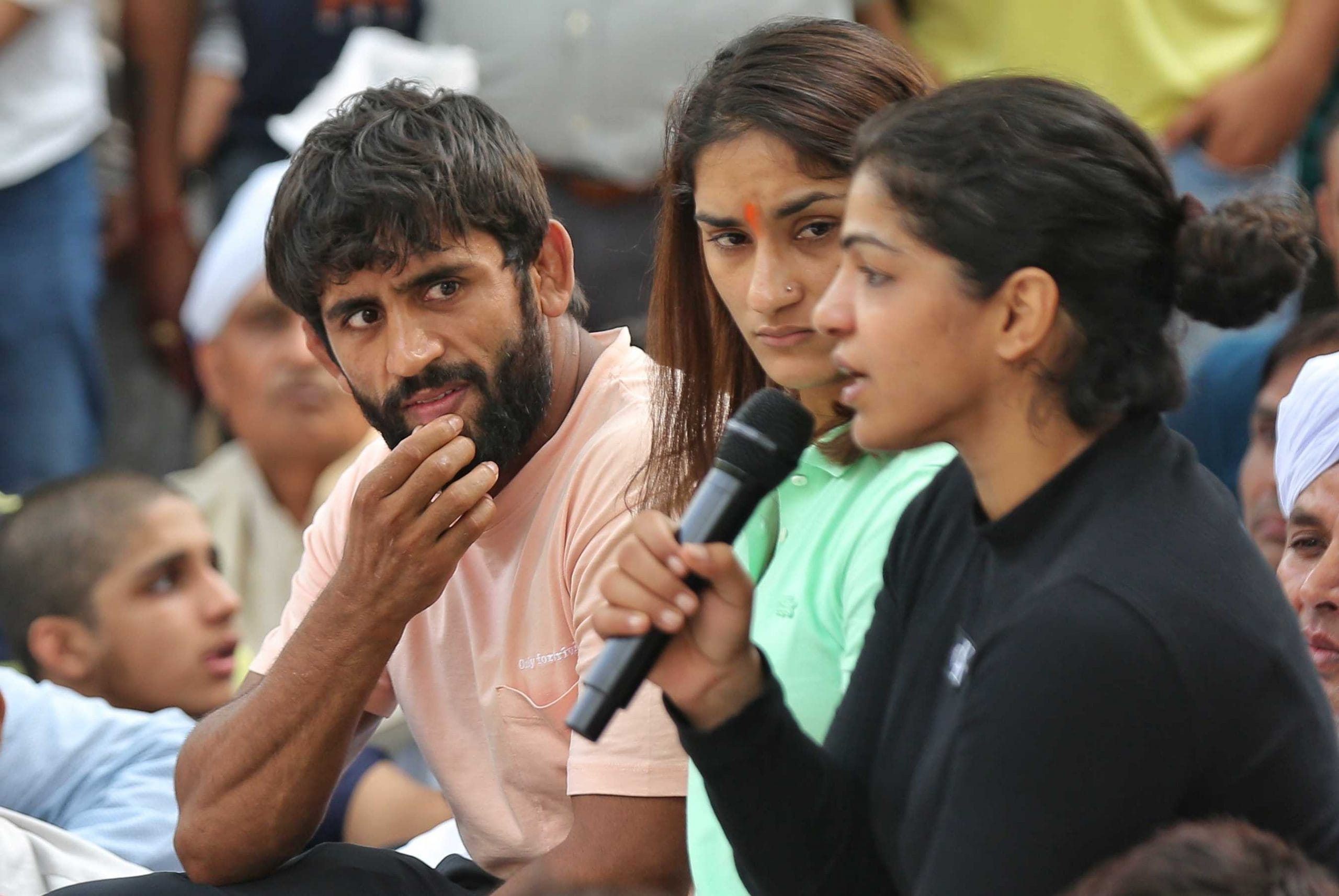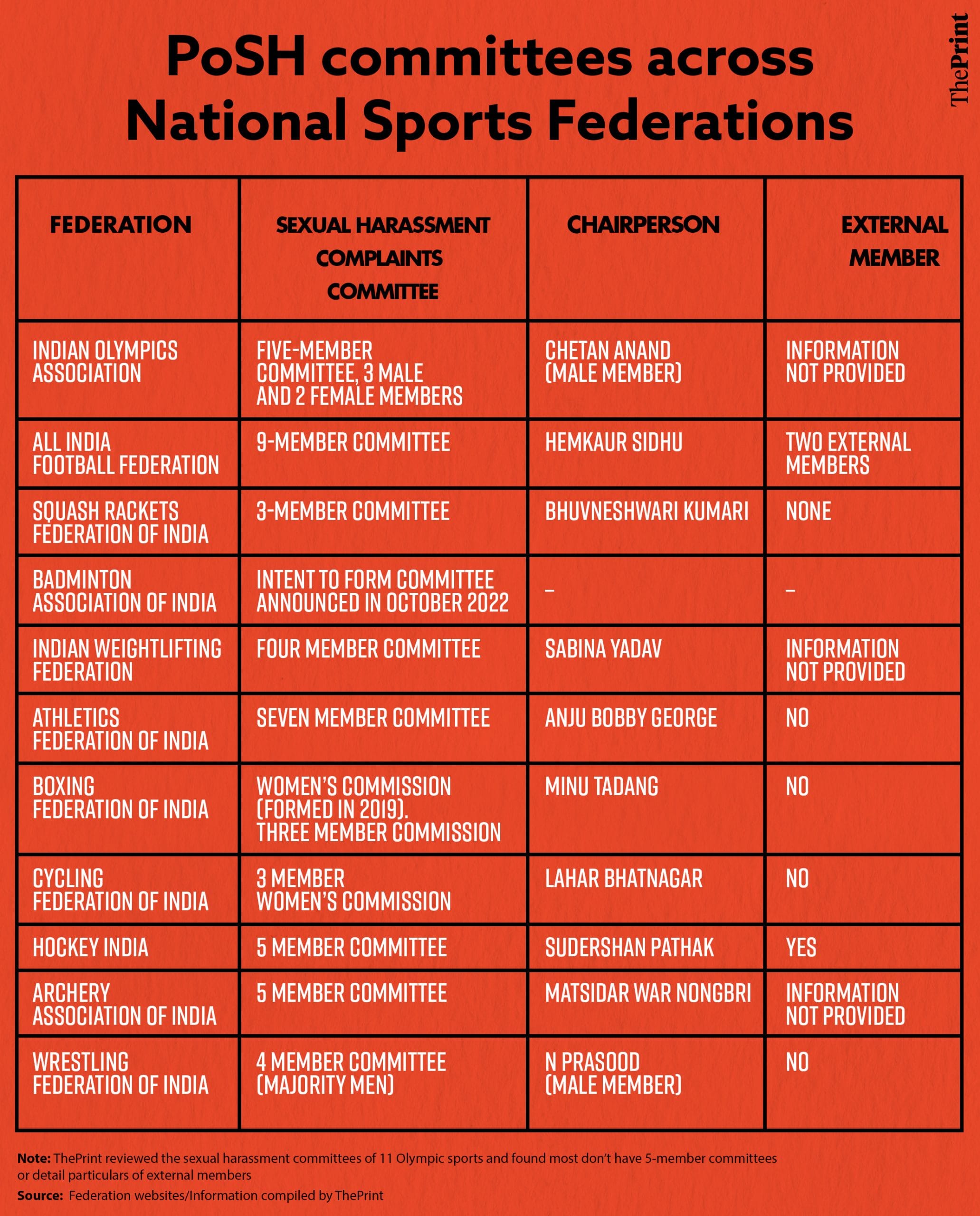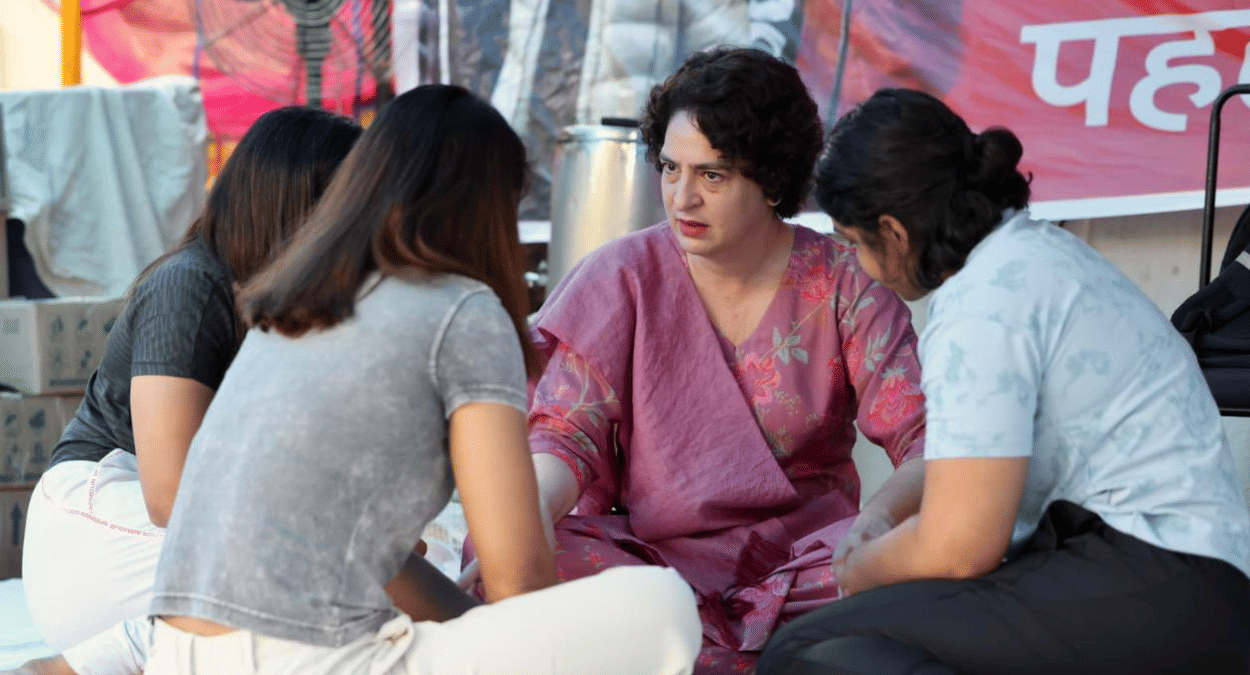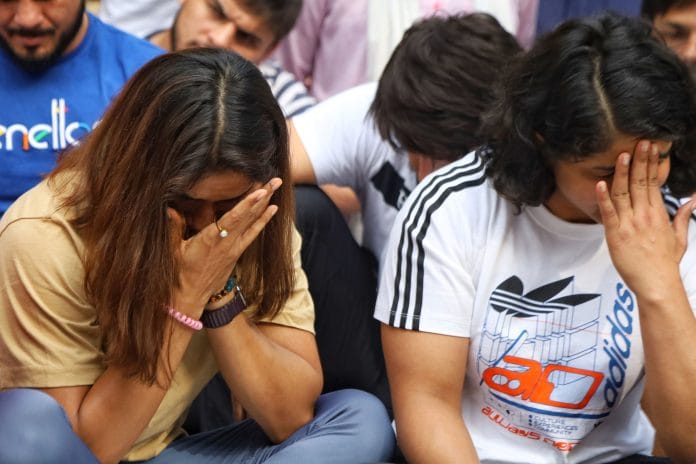New Delhi: Vinesh Phogat might have lost her voice. But it would take more than high fever, sleeping on the streets amid a heat wave with no access to a toilet, and slut-shaming on social media to make her lose her spirit. The World Championship medalist has started a movement to clean up the Wrestling Federation of India, and she won’t rest until her sisterhood’s allegations of sexual harassment against the organisation’s chief have been acted upon.
The last week has just been really fatiguing. But this fight is bigger than the Olympics for Vinesh Phogat, Sakshi Malik and scores of wrestlers protesting at Delhi’s Jantar Mantar.
After sitting in the sun for more than 12 hours, receiving two national leaders, giving endless media interviews and patiently listening to the speeches of hundreds of supporters, the wrestlers still have a long night ahead of them.
Phogat is casually scrolling through Twitter on her phone, retweeting important updates and words of solidarity. She is weak and ill but there is no time to recuperate. Malik, an Olympics medalist, mostly keeps to herself, occasionally responding to women who have come to visit them. Bajrang Punia is surrounded by well-wishers whispering strategies in his ears. He talks to reporters and smilingly obliges people who approach him for a selfie.
Not since the candle marches and late night sit-ins against the 2012 gangrape of a woman in a moving bus has Delhi seen such a protest mounted on the issue of women’s safety. What makes it challenging for the protesters this time is who they are up against — a powerful BJP politician and Wrestling Federation of India (WFI) chief, Brij Bhushan Sharan Singh, the Lok Sabha MP from Uttar Pradesh’s Kaiserganj.
And in a stunning show of support, men outnumber women by hundreds at the protest site.
“We have put our heads between the okhli and musal (tools used in grinding spices). What will happen will happen now. There’s no turning back,” Punia says.

Also read: ‘No panga with minister’—Haryana woman sprinter’s lone battle against sexual harassment
Fighting sexual harassment—and now the State
It’s a storm that has been gathering for some time.
The athletes had first staged a sit-in in January, with Vinesh Phogat breaking down on camera alleging widespread sexual abuse in wrestling. The protests were much more muted then and the government was also friendly. Much of it had to do with the way wrestlers conducted their protest — they were cautious about whom to platform and wouldn’t let politicians address the crowd. People like Brinda Karat and boxer Vijender Singh were among those who were asked to step off the stage.
Late on 20 January, they called off the protest after sports minister Anurag Thakur announced that a committee led by boxing legend MC Mary Kom was being formed and instructed to submit a report within four weeks. Brij Bhushan, in the meantime, would step down as WFI chief.
But neither did Singh resign nor did the committee release its report. The few ‘major findings’ it did make public acknowledged the absence of an Internal Complaints Committee at WFI.
All sport federations of India are required to have a committee led by a senior woman to probe allegations of sexual harassment under the Prevention of Sexual Harassment (PoSH) of Women at the Workplace Act 2013. As reported by ThePrint earlier, only a handful of associations follow the law in letter and spirit.

The WFI is even more notorious in this regard. Their five-member committee is headed by a man with only one woman in it—protesting wrestler Sakshi Mallik. This committee has received no complaint in the past five years, members had told ThePrint earlier.
What was left before the wrestlers then was a hope that the probe panel led by Mary Kom would investigate the allegations against Brij Bhushan and ensure justice for all the women wrestlers striving to make a mark for themselves in a traditionally male-dominated sport that has only recently opened its doors to women.
“There were 15 witnesses in the committee. All their information was being passed on to the WFI chief. Some of them got threatening calls to rescind their protests. Only seven have dared to complain to the police, who are also receiving bribe calls,” Somvir Rathee, a wrestler and the husband of Vinesh Phogat, told ThePrint. Incidentally, it took a Supreme Court notice to force the Delhi Police to finally register an FIR against Singh after seven women wrestlers, including a minor, came forward with allegations against the WFI chief and other federation coaches of sexual abuse over the years.
And so, the wrestlers are back on the streets of Delhi—only this time, the resolve is bigger, the fight is clearer, and the politicians are welcome. And in an unprecedented manner, leaders across party lines are responding to the wrestlers’ call against the endemic issue of sexual harassment in sports.
Congress leader Priyanka Gandhi, Delhi Chief Minister Arvind Kejriwal, and various other leaders have addressed the protests and expressed solidarity with the wrestlers, questioning the government inaction. Even Haryana’s Khap panchayat have pledged support and are giving speeches. On Saturday, 15 Khap members from Hisar were present at Jantar Mantar. “Just tell us when you need the entire Khap here. We’re ready to come and stand with you,” a Khap panchayat head said, addressing the crowd.

Also read: There’s only one way to tackle India’s sexual violence epidemic – sex education
No toilet, no fan, just mosquitoes—and a resolve
The wrestlers’ protest is growing each day, which means managing it is a logistical issue.
They sleep on the streets in unpredictable weather, oscillating between rain and harsh heat. The Delhi Police have cut electricity and water to the protest site, and mosquitoes reign supreme. There isn’t even a table fan or a toilet.
“I drink less water to avoid using the loo,” says Sudhesh Goyat, a prominent face from Haryana’s Jat community who also led the women farmers’ protest at Delhi’s Tikri border last year.
But it’s the physical and mental duress, including lack of training for fast-approaching Asian Games and Olympics qualifiers, that are getting to the wrestlers. But Punia is headstrong. “We aren’t beings of comfort. We are sons of the soil, of farmers. We are used to sleeping without a fan,” he said. “I am an international level wrestler. This stress is nothing,” he said.
In the absence of any well-defined team to manage the protest, members of the Phogat family and close allies have taken charge. Harinder Phogat, one of the protesters, said they’re bringing food and water at their personal expense. “Arranging for brunch alone costs us Rs 60,000-70,000 a day,” he says. Rathee, Vinesh’s husband, said they’ve brought four halwais (cooks) from Haryana and additional supplies will come in the next few days.
“Bangla Sahib Gurdwara management has offered to give us langar. Let’s see,” Rathee said.
Benevolent citizens are also chipping in. They come bearing gifts like a box of apples, and ask how they could be of any help. The protesters join their hands, “Maybe a couple of bottles of water for the people coming here.”
Jats of Haryana and Punjab also seem to be coming together.
Sanyukt Kisan Morcha has extended its support to the wrestlers, and may pass a resolution.
Many small farmer associations from all over Punjab have also met the wrestlers. Harish Nadda, vice president of Bharatiya Kisan Union (Ekta Dakonda) was one such representative. “Wrestlers are farmers’ sons. We’re here to extend support to them. Farmer protests have already shown India what our resolution can do,” he told ThePrint.

Also read: How to save your teenage child from sextortion on Instagram
About women safety, and pride of Haryana
Lal Bahadur Shastri’s slogan ‘Jai Jawan, Jai Kisan’ has a new iteration. It’s now ‘Jai Jawan, Jai Kisan, Jai Pehelwan’.
The slogan shows the protest has snowballed from being about women’s safety in sports to the pride and identity of India’s farmers.
“A soldier selflessly protects the nation. A farmer feeds the nation. And a wrestler brings glory to the nation. So ‘Jai Pehelwan’ is a natural addition to the naara,” Goyat said.
Traditionally, farmer families of Punjab and Haryana take pride in having a pehelwan in their house. While Punjab and Uttar Pradesh have not excelled in wrestling over the years, Haryana has taken Indian wrestling to new heights.
It is usual for farmers to travel 50 km a day with a tank full of almond milk to their children’s akhada every morning—the traditional ‘protein shake’ of a Haryana wrestler. For example, Sushil Kumar’s father came to Chattarpur in Delhi every day from his house to deliver milk for years.
And so, the identity of farmers and wrestlers is intertwined. They belong to the same family and same villages, which means the government’s treatment of their sons and daughters is personal.
“These are our daughters who have been endangered by the BJP. Our daughters are being called liars in Delhi. Our daughters are sleeping on the street,” said Alok Balhara, president of Jat Aarakshan Sangharsh Samiti.
The question of women’s rights raised in speeches is largely about the “izzat” (dignity) of the daughters of Haryana.
The Jats are also livid about the protest being labeled as one belonging to a community. “When our children go and win medals on the international stage, nobody calls them Haryanvi or Jat. But suddenly we’re Jats when we demand justice? Is this justified?” a Khap leader yelled into the mic at Jantar Mantar.
Farmer organisations from Uttar Pradesh and Uttarakhand invoked the Lakhimpur Kheri incident where a convoy of union minister Ajay Mishra’s son ran over farmers protesting against the Centre’s farm laws. They said the BJP shelters people who commit crimes against farmers. “First they protected Ajay Mishra Teni, now Brij Bhushan. The BJP is with people who are against farmers!” thundered a speaker.
But the protest is also showing signs of how men from Haryana’s patriarchal society are starting a discussion on matters of consent and sexual harassment.
“Madamji, isn’t it so difficult to establish accountability in harassment?” A protester asks. “If I put these two fingers on your arms without your permission, is that also harassment?”
While these questions hang, many express gratitude to the sportspersons, if somewhat theatrically. A man knelt in front of Bajrang Punia on Saturday night and spread his arms, “I want to thank you for what you’re doing for the nation!”
Also read:
A truly people’s protest
Having made Jantar Mantar their home, India’s top wrestlers have no time to rest. They’ve had a long day welcoming college students, local residents, advocates, social workers, police officers with selfie requests, and everyone else turning up at the capital’s protest site for all.
Young women and men approach to thank the wrestlers. They sing songs for them and sit with candles till late at night. Some sleep under the sky, without mosquito nets.
“I am here because they’re fighting for my rights. I am here because every woman should be here,” said a second-year student of Gargi College, whose students were recently groped at a college event.
Madhurima, a student of Jawaharlal Nehru University, addressed the gathering and said the protests are not just wrestlers’ alone but of all women. “The Prime Minister has called all of us (students of JNU) andolan jeevi (compulsive agitators). But today, each one of us has to take to the streets, become andolan jeevis to get our voices heard,” she said.
Unlike in January, the wrestlers’ battle the second time around has magnified. Not only are there no talks or assurances from the government, the silence of leading sports figures are breaking many hearts. And statements from authorities, such as from sporting legend and Indian Olympic Association (IOA) president PT Usha, have only added to the disappointment of the protesting athletes. On TV and social media, the campaign to tarnish the protest as “anti-government” and “propaganda” is also in full swing.
But the wrestlers have decided not to pay heed to the ‘IT Cell’. “Women are speaking in our favour too. We’re focusing on the positives,” Vinesh Phogat said. Since her statement calling out sportspersons for their silence, boxer Nikhat Zareen, javelin thrower Neeraj Chopra, footballer Bhaichung Bhutia, and tennis star Sania Mirza have spoken up in support. Phogat also retweeted a Carnatic music celebrity explaining why Sakshi Malik would entertain her alleged abuser at her wedding. “She didn’t have a choice.”
At the protest site though, wrestlers are sceptical about moles breaching the venue. But they aren’t afraid. “A journalist from Lucknow has come to meet you,” someone informed Punia and Phogat.
“Must be Netaji’s man. Don’t let him in,” Punia said. But a physically ill Vinesh Phogat stood up, regaining her voice. “Who is it? I’ll take care of him,” she said and walked away towards the visitor.
This article is part of a series called PoSH Watch.
(Edited by Prashant)






